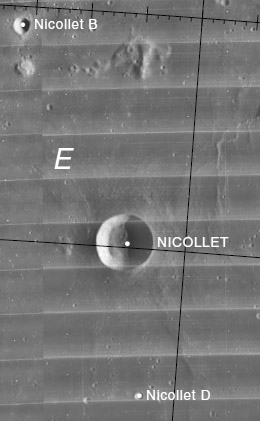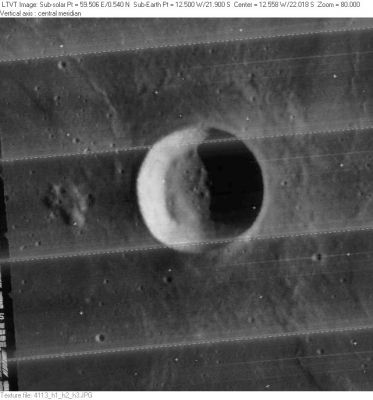Nicollet
Contents
[hide]Nicollet
|
Lat: 21.9°S, Long: 12.5°W, Diam: 15 km, Depth: 2.03 km, Rükl: 54 |
LO-IV-113H
Nicollet and the hillock Nicollet Epsilon immediately westward of it, which is an interesting guide to recognize crater Nicollet, especially while observing the moon through telescope.- DannyCaes Nov 2, 2013
Images
LPOD Photo Gallery Lunar Orbiter Images Apollo Images
- Although it (the name Nicollet) is not mentioned in the LPI's search-list of orbital Apollo photographs, it (crater Nicollet) WAS photographed during the mission of Apollo 16 in april 1972. Nicollet is visible slightly "above" (north of) the lowest and most central part of the curved horizon in Apollo 16's oblique south-looking metric/mapping Fairchild-camera photograph AS16-M-2485 (zoom-able HiRes scan of the ASU's Apollo Image Archive).
- A dark spot or low-albedo hillock such as Mons Moro is located near the ridge Nicollet Psi. This low-albedo hillock was captured on Lunar Orbiter 4's photograph LOIV-113-h2 (near the frame's lower left corner).
Research Apollo 16 and Lunar Orbiter 4 photography: Danny Caes
Maps
(LAC zone 94B3) LAC map Geologic map
Description
Description: Elger
(IAU Directions) NICOLLET.--A conspicuous little ring-plain on the W. of Birt, and somewhat smaller. Between the two is a still smaller crater, from near which runs a low mountain range, nearly parallel to The Straight Wall, to the region S.W. of the Stag's Horn Mountains. Here will be found three small light-surrounded craters arranged in a triangle, with a somewhat larger crater in the middle.
Description: Wikipedia
Additional Information
- Depth data from Kurt Fisher database
- Arthur, 1974: 2.03 km
- Westfall, 2000: 2.03 km
- Viscardy, 1985: 2.03 km
- From the shadows in LO-IV-113H, Nicollet is about 1950 m deep. - Jim Mosher
- Satellite crater Nicollet B is on the ALPO list of bright ray craters.
- Included on the ALPO list of banded craters
- TSI = 20, CPI = 20, FI = 20; MI =60 Smith and Sanchez, 1973
- A dark spot at 19°30' South/ 10°55' West, near the ridge Nicollet Psi, is an interesting target for telescopic observers of the moon. Research Danny Caes. See also LPOD Succession (the "black dot" near the upper left corner of it).
Nomenclature
- Named for Joseph Nicholas Nicollet (1786-1843), a French astronomer. As an assistant at the Paris Observatory in the early 1820's, Nicollet was noted for combining his own observations of the crater Manilius with earlier ones by Bouvard to obtain the then most accurate values for the Moon's librations. Most of the remainder of Nicollet's professional life was spent as a surveyor/geographer in the United States. He has been mentioned (but probably falsely) in connection with the Great Moon Hoax of 1835, in which the New York Sun newspaper ran a series of fantastic stories about discoveries of life on the Moon purportedly made by Sir John Herschel. The articles are available on Google Books, where Nicollet is listed as a co-author (see also Wikipedia).
- According to Whitaker (p. 223), this name was introduced by Neison.
- Nicollet B (north-northwest of Nicollet) seems to have been called Profatius by Riccioli (source: page 214 in E.A.Whitaker's Mapping and Naming the Moon).
- Nicollet Epsilon (hill immediately west of Nicollet).
- Nicollet Theta (hill north of Nicollet).
- Nicollet Psi (hill or ridge northeast of Nicollet) (there's a low-albedo spot just north of Nicollet Psi, more-or-less of the same kind as Mons Moro on Rukl 42).
Lettered Craters

Excerpt from the USGS Digital Atlas of the Moon.
LPOD Articles
Bibliography
